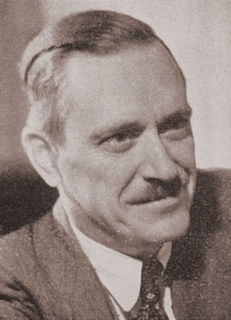A Quote by Ralph Waldo Emerson
The death of a dear friend, wife, brother, lover, which seemed nothing but privation, somewhat later assumes the aspect of a guide or genius; for it commonly operates revolutions in our way of life, terminates an epoch of infancy or of youth which was waiting to be closed, breaks up a wonted occupation, or a household, or style of living, and allows the formation of new ones more friendly to the growth of character.
Related Quotes
In later life, as in earlier, only a few persons influence the formation of our character; the multitude pass us by like a distant army. One friend, one teacher, one beloved, one club, one dining table, one work table are the means by which one's nation and the spirit of one's nation affect the individual.
The birth of Christ our Lord was more than an incident, it was an epoch in the history of the world... He came to teach us the character of God, and by example and precept pointed out the path which, if we walk in it, will lead us back into his presence. He came to break the bands of death with which man was bound, and made possible the resurrection by which the grave is robbed of its victory and death of its sting.
I believe that a desirable future depends on our deliberately choosing a life of action over a life of consumption, on our engendering a lifestyle which will enable us to be spontaneous, independent, yet related to each other, rather than maintaining a lifestyle which only allows to make and unmake, produce and consume - a style of life which is merely a way station on the road to the depletion and pollution of the environment. The future depends more upon our choice of institutions which support a life of action than on our developing new ideologies and technologies.
If they [enlightened men] take any interest in examining, in the infancy of our species, the almost obliterated traces of so many nations that have become extinct, they will doubtless take a similar interest in collecting, amidst the darkness which covers the infancy of the globe, the traces of those revolutions which took place anterior to the existence of all nations.
The nineteenth century, utilitarian throughout, set up a utilitarian interpretation of the phenomenon of life which has come down to us and may still be considered as the commonplace of everyday thinking. ... An innate blindness seems to have closed the eyes of this epoch to all but those facts which show life as a phenomenon of utility
This self now as I leant over the gate looking down over fields rolling in waves of colour beneath me made no answer. He threw up no opposition. He attempted no phrase. His fist did not form. I waited. I listened. Nothing came, nothing. I cried then with a sudden conviction of complete desertion. Now there is nothing. No fin breaks the waste of this immeasurable sea. Life has destroyed me. No echo comes when I speak, no varied words. This is more truly death than the death of friends, than the death of youth.
We dress our garden, eat our dinners, discuss the household with our wives, and these things make no impression, are forgotten next week; but in the solitude to which every man is always returning, he has a sanity and revelations, which in his passage into new worlds he will carry with him. Never mind the ridicule, never mind the defeat: up again, old heart! — it seems to say, — there is victory yet for all justice; and the true romance which the world exists to realize, will be the transformation of genius into practical power.
It is not desirable that we should live as in the constant atmosphere and presence of death; that would unfit us for life; but it is well for us, now and then, to talk with death as friend talketh with friend, and to bathe in the strange seas, and to anticipate the experiences of that land to which it will lead us. These forethinkings are meant, not to make us discontented with life, but to bring us back with more strength, and a nobler purpose in living.
The sceptics end in the infidelity which asserts the problem to be insoluble, or in the atheism which denies the existence of any orderly progress and governance of things: the men of genius propound solutions which grow into systems of Theology or of Philosophy, or veiled in musical language which suggests more than it asserts, take the shape of the Poetry of an epoch.









































